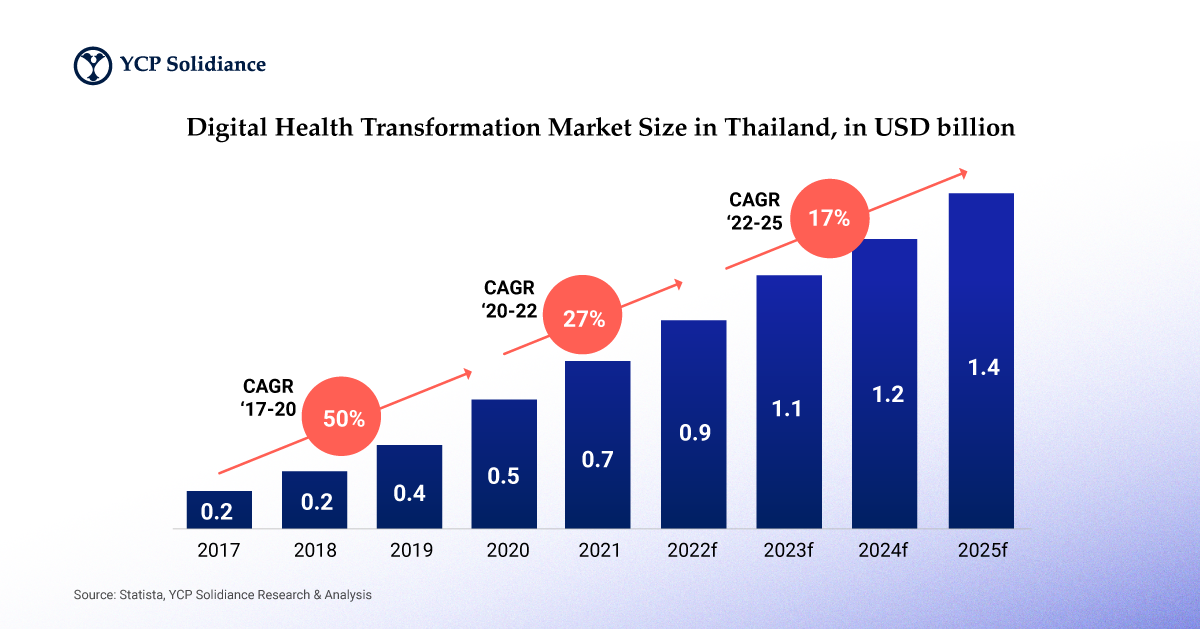As one of the leading players in the world in the healthcare industry, Thailand and its key stakeholders (e.g., hospitals, doctors, government) remain proactive in improving its healthcare services– both for the benefit of domestic and international parties. The commitment of the Thai healthcare sector has enabled the industry to accelerate technological innovation, wherein digital health transformation and telemedicine 2.0 are key catalysts to development.
To learn about how Thailand’s healthcare system is leveraging digital technology to address key issues, read this excerpt from our latest white paper, Digital Health Transformation and Telemedicine 2.0 in Thailand, which you can read in full here.
Digital Health Transformation – Market Size and Applications
The Digital Health Transformation market in Thailand has been growing considerably over the past few years, with several emerging technologies, such as Telemedicine and Mobile Health applications, becoming more common in the market.
Applications of digital health transformation in Thailand include (1) Telemedicine, (2) Electronic Health Records, (3) Mobile Health Applications, (4) Health Analytics, (5) Online Pharmacies, and (6) Wearable Technologies.

Inefficient healthcare systems, limited healthcare resources, and rising healthcare costs are the most significant factors driving the spread and adoption of digital health technologies in Thailand.
Inefficient Healthcare Systems – Thailand’s healthcare system faces challenges in terms of inefficiencies which lead to long wait times, bureaucracy, and fragmented health data. This is largely due to the high reliance on manual or analog processes throughout different areas of healthcare operations.
Integration of digital systems and solutions will streamline healthcare processes and improve the overall efficiency and delivery speed of healthcare services, as well as improve overall patient convenience and satisfaction.
Limited Healthcare Resources – There is a notable shortage of healthcare professionals and resources despite the growing demands for healthcare in Thailand. This issue is further amplified in rural areas as ~80% of healthcare facilities are in major cities.
Through digital health technologies, healthcare services are able to reach patients that are not physically present using online avenues. This allows healthcare services to reach even far-flung areas in the country, particularly those in rural or provincial regions.
Rising Healthcare Costs – With the cost of healthcare in Thailand continuously increasing, more and more patients are struggling to afford the necessary medical treatments, especially for chronic diseases, which are prevalent in the country.
Digital health technologies and systems help reduce healthcare costs by improving the operational efficiency of healthcare facilities, enhancing the delivery to patients, and reducing the reliance on in-person visits.

Telemedicine is a growing part of digital health in Thailand and is driven by key health problems such as insufficient healthcare facilities and resources, and increasing costs of healthcare which are not addressed by traditional offerings.
Comparison Between Telemedicine 1.0 & Telemedicine 2.0 – While telemedicine is a good first step in terms of convenience, telemedicine 2.0 improves on the current technology by adding more applications to capture more patient data as well as integration with various facilities to allow for more healthcare use cases.
Future trends within the healthcare industry in Thailand indicate increased collaboration between public and private entities, an increase in investment amounts flowing into the industry, and the integration of even newer digital technologies.
Public-Private Cooperation – An increase in collaboration between the Thai government and private healthcare providers is an expected development, as more government agencies have been seeking partnerships with healthcare and digital platform providers in order to promote the development of digital technologies.
For example, the National Health Security has partnered with healthcare providers such as Good Doctor and Clicknic to support the development of digital technologies; more examples like this can be expected in the future.
Increased Investment in the Healthcare Industry – As the demand for more efficient healthcare services continues to grow, the level of technologies used to deliver these services will also improve in terms of robustness and sophistication.
The development of the industry necessitates large amounts of investment, which is expected to increase over the years from both local and international players, resulting in a wider range of healthcare offerings and services that promote the overall efficiency and effectiveness of healthcare services delivered to patients.
Integration of New Digital Technologies – Since some of the digital health technologies in Thailand are still in their early or infancy stages, there is still a lot of room to grow and develop digital technologies that are to be integrated into the overall healthcare industry.
Other digital health technologies, such as the use of blockchain technologies to promote the security of patient medical records and speed of transfer, are expected to increase in adoption in the coming years as the industry continues to grow and develop.
To get further insight into Asia’s business industries and recent developments made, subscribe to our newsletter here and check out these reports:
